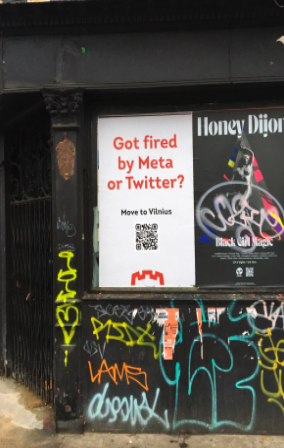Having failed to publish any week notes for sometime - here’s a bumper Christmas addition to see you though the whole of December.
What makes a good data story
The month started with some great discussions with Libby Young who has been looking at what makes good ‘data’ stories for us. Libby has an interesting take both as an academic who has thought deeply about the digital transformation of society especially with a social justice lens, and a ex-comms professional in the real world (as it were). We’ll be sharing more about her work later, but her findings so far have left me with a few really useful reflections
- It seems any story involving data that is going to cut through into the common sense needs people in it and finding those people is vital. The story then has to use personal experiences and the impacts of data on those experiences to reveal to the ‘reader’ the systems beneath. This gives it the energy, emotional engagement and moral force. It is also quite reassuring that it is still peoples’ stories, the empathy of flesh and bone in a world of digital and tech so to speak, that is vital. (As a famous fundraising strategist Ken Burnett once said: people give to people. As a campaigner I’m also pretty sure that people campaign for people too.)
- The stories also need to show the system through the web of relationships that connect (and contrast) the individual to others through data, but equally be clear on who has the power and gets to gain from those relationships.
- Finally, all that data stuff - collective, relational, synthetic, predictive, nonrival - is still complex and slippery and we don’t have ‘common sense’ language for it yet. A survey of google searches by Libby on collective or democratic data governance turned up virtually nothing. Though terms like Big Data are beginning to land.
Commissioning Connected by Data: The Movie
As part of working out how to communicate about the ‘data stuff’, we also realised we needed an explainer to help get over visually and creatively what the written and linear can find hard. Equally, sometimes you need to do not just think, so actually trying to make a short 90 sec film to achieve this would in itself push along working it out too! To help we were really pleased to commission creative production company Brickwall who have worked in both the data space, on health data for example, and in the campaign space with Greenpeace and others. You can read the brief here - we’re hoping to have an output to show everyone in early 2023.
Creative Comms Competition
As well as working to make a new film, we were also very pleased to begin working alongside Future Narratives Lab and students from the MA course in Media, Communications and Critical Practice at London College of Communication to explore new ways to reimagine our relationships with data. The challenge the students have been given is to produce an effective comms campaign designed to help educate and shift perceptions both of the public and non-expert policy makers and politicians.
Future Narratives Lab ran a similar process last year with some great outputs so we hope this year we can also support and inspire even more great creative thinking to crack the data comms challenges we are all facing.
Building the Coalition with the help of a Lord
Alongside telling the data story, one of Connected by Data’s other aims is to try and help build a coalition that links the people thinking about data at high level with those dealing with the real life impacts.
We are very lucky to have a supportive ally in this in Lord Tim Clement-Jones, who helped sponsor our roundtable event in the House of Lords. The event explored how to give people a powerful say over the data that impacts them, and do this in the context of the forthcoming Data Protection and Digital Information Bill.
We had some 40 people from across civil society, policy and politics attend what was a lively and I hope useful discussion. What I found particularly interesting was framing it through the issue lenses of Work and Workers Right and Children and Children’s Rights particularly in education - again putting the people into the data in the real world where the stakes are high and power can be easily abused. Doing it this way seemed to produce some important common threads and links [Link to notes when ready] particularly, as Lord Clement-Jones: summarised at the end: showing the need for a more horizontal approach requiring more common values and principles to underpin everything.
Power to the People and a Professor
Finishing off a month of thinking about people and power was one of my personal highlights - a small round table with Professor Shoshana Zuboff organised with Reset. I always like a grand narrative and, with sprinkling of Hayek and Friedman and even perhaps Marx and Hegel: Professor Zuboff eloquently laid out how the increasing concentration of data, information, computational resource and so power is a feature of next stage of capitalism - creating both an oligopoly of knowledge and oligarchy of power with the dominant corporate players even challenging democracy. As a big idea it is certainly very compelling. The round table however also asked what we can actually do about this - how to put the people into the struggle, how to build the collective voice of citizens to challenge this power and demand new democratic institutions to represent and enforce our collective interests for the common good.
It was in thinking about the practical element of these questions, that I also came across the recent work done by the Ada Lovelace Institute looking at the need to build collective citizen power as a counter, bringing real communities together in their common self interest. Strikingly, in a world where Professor Zuboff suggests that all our relationships are increasingly mediate and surveilled by those who control the digital and data, it is perhaps actually only though the sort of organising that places lived relationships between people at the heart and builds power though common interest, that this can be resisted.
Back to Reality
Finally the big question of how to turn big thinking into reality also took another step forward this month, with the appointment of our first Policy and Campaigns Associate to work on the advocacy side of Connected By Data. We’re really pleased to be welcoming Adam Cantwell-Corn who will be starting in January. Adam’s background was setting up and running the Bristol Cable - an award winning community owned and run news platform aimed at giving the community in Bristol a voice. Following the principle of being an ‘impact producer’ Adam has worked on a number of high profile story driven campaigns linking local journalism with effective local and national policy influencing. Adam has also recently developed his interest in connecting campaigning and policy making, finishing an MPA at UCL in London. It’s brilliant to have him on board.
And actually finally…
In a related/unrelated sort of way, I spotted this on Deptford High Street this morning where I live. Made me smile. Happy Festive Season All.

